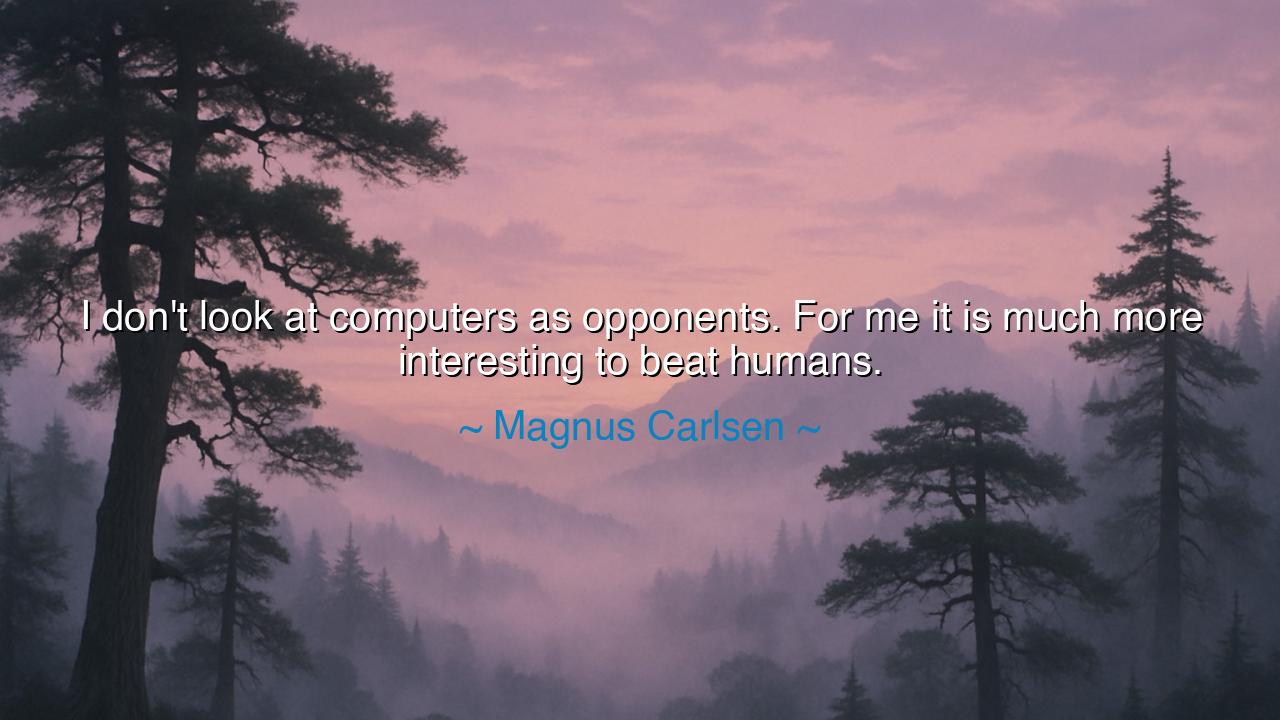
I don't look at computers as opponents. For me it is much more
I don't look at computers as opponents. For me it is much more interesting to beat humans.






"I don't look at computers as opponents. For me it is much more interesting to beat humans." – Magnus Carlsen
In the grand story of human competition, we find countless examples of those who have sought to test their skill against both the natural world and their fellow beings. The great philosophers and warriors of the past, like Alexander the Great, Hannibal, and Socrates, tested their wits and strength not against the forces of nature, but against the minds and skills of others. They understood that the true challenge was not in the machine-like precision of the world, but in the human spirit—its unpredictability, its flaws, and its brilliance. Magnus Carlsen, the modern-day chess champion, echoes this ancient pursuit in his remarkable insight: it is the human mind, with its creativity and emotion, that offers the true challenge—not the cold, calculated moves of a computer.
Consider the ancient world, where the games of strategy—whether in the form of battle or in contests like chess—were the ultimate test of one's intellect. In those times, leaders, generals, and kings would seek to outwit one another in ways that tested not just their knowledge, but their cunning, their intuition, and their ability to read their opponent. Magnus Carlsen’s approach is a modern echo of this, where the pursuit of victory is not about overcoming the predictability of a machine, but about mastering the complex, ever-evolving strategies that arise when two human minds meet in competition.
In the ancient game of chess, as old as the Persian Empire, the pieces were not merely tools of war on a small battlefield—they were reflections of the human condition. The king and queen, the pawns, knights, bishops, and rooks—each symbolized a different aspect of society, of leadership, of power and sacrifice. To win at chess in its truest form was not merely about outmaneuvering a machine; it was about outthinking another human being, seeing into their intentions, and reacting with the same depth of strategy and foresight. In this way, chess has always been a battle of minds, not just a game of moves. The machines, no matter how calculating, lack the ability to think with the same nuance, the same emotional intelligence that a human opponent brings to the board.
Think of the great battles of the past, where armies did not simply clash on the battlefield but fought a deeper psychological war. Sun Tzu, in his immortal work The Art of War, teaches that the true strategy lies in understanding not just the terrain or the opponent’s weapons, but their mind. In this way, Magnus Carlsen’s words are a reflection of the ancient wisdom: the ultimate challenge comes not from defeating an inanimate object that follows fixed patterns, but from the fluid, dynamic nature of human decision-making. To defeat a human opponent is to tap into the complexity of the human mind, with all its strengths and weaknesses—an ever-changing landscape that no machine can fully replicate.
Magnus’ view on computers in chess also touches upon the idea of competition as a means of personal growth. He does not seek the easy win that a computer might offer, but rather the true challenge of facing a human—someone who is capable of surprise, of innovation, and of improvisation. The human element in any competition, whether in chess or in life, adds an unpredictable and deeply meaningful layer to the experience. It is this challenge that allows for growth, for learning, and for the joy of triumph over adversity.
But there is also a profound lesson in Carlsen’s words about the relationship between humans and technology. Computers, no matter how advanced, cannot replace the unique human qualities that make competition meaningful. They can simulate strategy, they can compute faster than any human ever could, but they lack the creativity, the emotion, and the imperfection that make human competition so rich. A machine might help us learn, it might test our limits, but it will never replace the value of the human connection that competition brings.
Thus, the lesson we must take from Carlsen’s philosophy is twofold: first, that the true challenge of life is not to overcome the mechanical world, but to face the human world, with all its complexity, unpredictability, and capacity for growth; and second, that competition—whether in the realm of games, business, or life—is ultimately about pushing our human spirit to its highest potential. Let us not be seduced by the allure of the machine, but instead embrace the beautiful, ever-changing challenge of competing and growing with each other, for it is in this human connection that we will find the greatest rewards.






AAdministratorAdministrator
Welcome, honored guests. Please leave a comment, we will respond soon